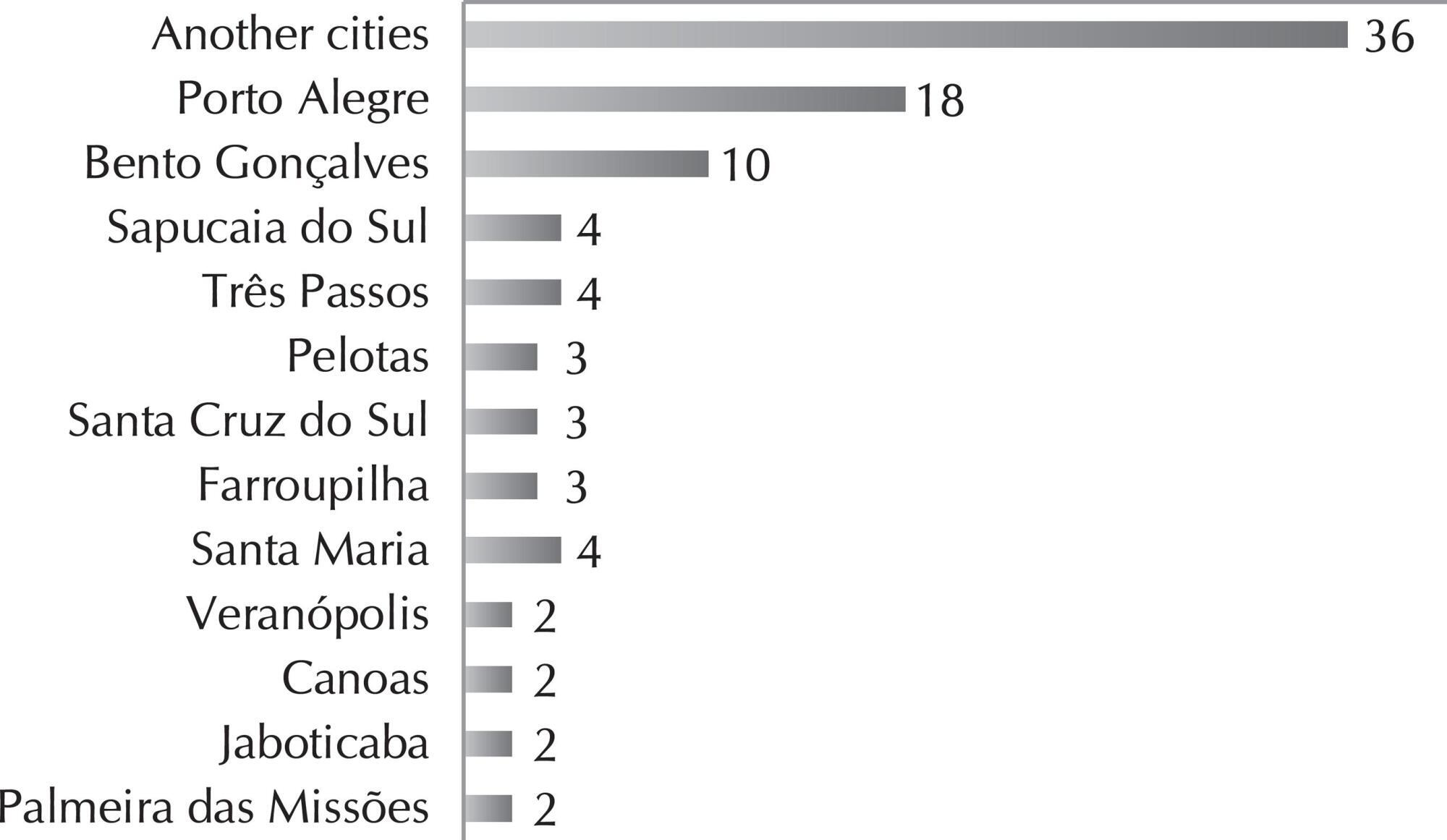-
ORIGINAL ARTICLE
Moral sensitivity components identified among nurses from Intensive Care Units
Revista Brasileira de Enfermagem. 2019;72(suppl 1):2-8
02-01-2019
Resumo
ORIGINAL ARTICLEMoral sensitivity components identified among nurses from Intensive Care Units
Revista Brasileira de Enfermagem. 2019;72(suppl 1):2-8
02-01-2019DOI 10.1590/0034-7167-2017-0202
Visualizações0Ver maisABSTRACT
Objective:
to identify ethical problems from the components of moral sensitivity among nurses of Intensive Care Units.
Method:
qualitative, exploratory-descriptive study developed in a hospital in the South of Brazil with 19 nurses working in intensive care units through semi-structured interviews that were analyzed through discursive textual analysis.
Results:
ethical education, dialogue, relationships with other health team members, professional autonomy, knowledge, personal values, effective communication, leadership and patients' positive outcomes were identified as important components of nurses' moral sensitivity, and comprise the domains of moral consciousness, benevolent motivation, and spontaneous moral perception.
Final considerations:
the components of moral sensitivity identified in this study facilitate nurses' instrumentalization in the face of decision making and ethical problems in the intensive care setting.
-
ORIGINAL ARTICLE
Generating situations of Moral Distress in Primary Care Nurses
Revista Brasileira de Enfermagem. 2019;72(1):35-42
01-01-2019
Resumo
ORIGINAL ARTICLEGenerating situations of Moral Distress in Primary Care Nurses
Revista Brasileira de Enfermagem. 2019;72(1):35-42
01-01-2019DOI 10.1590/0034-7167-2018-0378
Visualizações0Ver maisABSTRACT
Objective:
To analyze the situations generating Moral Distress in Primary Care nurses from different regions of Brazil.
Method:
Qualitative research, with 13 nurses of the Brazilian Primary Health Care, through a semi-structured interview and submitted to the Discursive Textual Analysis, with the resources of the software ATLAS.ti 7.0.
Results:
They are presented in four categories, relating the Moral Distress to the professional; health services; users and conflicts in professional practice.
Final Considerations:
By assuming ethical and political values as guides to their action, nurses give greater visibility to the moral content of many problems and weaknesses that could be seen only by the bias of working conditions.
-
RESEARCH
Teaching strategies: promoting the development of moral competence in undergraduate students
Revista Brasileira de Enfermagem. 2018;71(suppl 4):1650-1656
01-01-2018
Resumo
RESEARCHTeaching strategies: promoting the development of moral competence in undergraduate students
Revista Brasileira de Enfermagem. 2018;71(suppl 4):1650-1656
01-01-2018DOI 10.1590/0034-7167-2017-0704
Visualizações0Ver maisABSTRACT
Objective:
To identify strategies and spaces used by professors to promote the development of the moral competence of nursing undergraduate students.
Method:
Qualitative research, developed with 20 nursing professors, through a semi-structured interview, from July to October 2016. Data were submitted to discursive textual analysis.
Results:
Three categories were constructed: Active methodologies as strategies for the development of moral competence; Knowledge and development of clinical reasoning as motivating spaces of moral competence; Attitude of professors as a strategy for dialogue, empathy, recovery of moral values and development of caring skills.
Final considerations:
The use of strategies and spaces to develop pedagogical actions favors the search for knowledge, clinical reasoning and the approach of ethical and moral aspects that collaborate for the development of the moral competence of nursing undergraduate students.
-
RESEARCH
Nursing students facing moral distress: strategies of resistance
Revista Brasileira de Enfermagem. 2018;71(suppl 4):1663-1670
01-01-2018
Resumo
RESEARCHNursing students facing moral distress: strategies of resistance
Revista Brasileira de Enfermagem. 2018;71(suppl 4):1663-1670
01-01-2018DOI 10.1590/0034-7167-2017-0072
Visualizações0Ver maisABSTRACT
Objective:
To understand the resistance strategies adopted by undergraduate students in nursing, faced with situations of moral distress (MD).
Method:
Qualitative research, developed in three universities in the south of Brazil, two federal and one private, with 21 undergraduate students in nursing from December 2015 to February 2016; the data was submitted to the discursive textual analysis and Foucauldian theoretical reference.
Results:
Students resisting demonstrate a sense of self-preservation and moral empowerment. Moreover, non-resistance initiatives are related to the fear of possible sanctions. Thus, by resisting or not, students may experience both positive and negative repercussions.
Final considerations:
By resisting, students aim to defend what they believe to be right, demonstrating their moral empowerment in the face of their moral distress. However, the exercise of disciplinary power seems to contribute to their moral fragilization, making it difficult to implement resistance strategies.

-
RESEARCH
Moral sensitivity in Primary Health Care nurses
Revista Brasileira de Enfermagem. 2017;70(2):308-316
01-01-2017
Resumo
RESEARCHMoral sensitivity in Primary Health Care nurses
Revista Brasileira de Enfermagem. 2017;70(2):308-316
01-01-2017DOI 10.1590/0034-7167-2016-0453
Visualizações0Ver maisABSTRACT
Objective:
to characterize the profile and describe the moral sensitivity of primary health care nurses.
Method:
this is a quantitative, transversal, exploratory, descriptive study. The data were collected through the Moral Sensitivity Questionnaire translated and adapted to Brazil. 100 primary health care nurses participated, from Rio Grande do Sul, Brazil. The data collection took place during the months of March and July 2016, in an online form. The analysis of the data occurred through descriptive statistical analysis.
Results:
the nurses had an average moral sensitivity of 4.5 (out of 7). The dimensions with the greatest moral sensitivity were: interpersonal orientation, professional knowledge, moral conflict and moral meaning.
Conclusion:
the nurses of Rio Grande do Sul have a moderate moral sensitivity, which may contribute to a lower quality in Primary Health Care.

-
RESEARCH
Cross-cultural adaptation and validation of the Moral Distress Scale-Revised for nurses
Revista Brasileira de Enfermagem. 2017;70(5):1011-1017
01-01-2017
Resumo
RESEARCHCross-cultural adaptation and validation of the Moral Distress Scale-Revised for nurses
Revista Brasileira de Enfermagem. 2017;70(5):1011-1017
01-01-2017DOI 10.1590/0034-7167-2016-0518
Visualizações0Ver maisABSTRACT
Objective:
Cross-culturally adapt and validate the Moral Distress Scale-Revised for nurses.
Method:
Quantitative, analytical cross-sectional study conducted with 157 nurses of two hospital institutions of Southern Brazil, one public and one philanthropic. Procedures conducted: cultural adaptation of the instrument according to international recommendations; validation for the Brazilian context.
Results:
Face and content validation was considered satisfactory as assessed by a specialist committee and a pretest. The instrument demonstrated satisfactory internal consistency through frequency and intensity analysis per question in the 157 items and per subgroups of the various hospital units. Cronbach’s alpha was 0.88 for the instrument and between 0.76 and 0.94 for hospital units. Pearson’s correlation found a moderate association for moral distress among nurses.
Conclusion:
The Moral Distress Scale-Revised – Brazilian version is a valid instrument for the assessment of moral distress in nurses.



